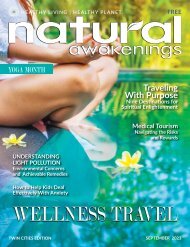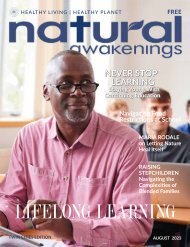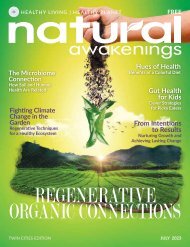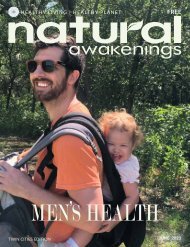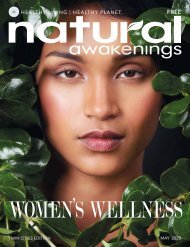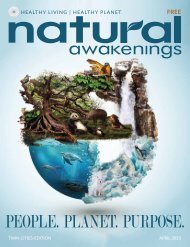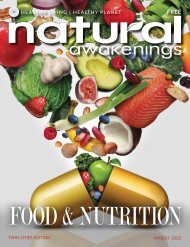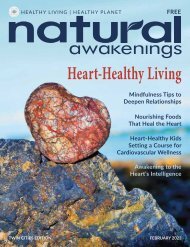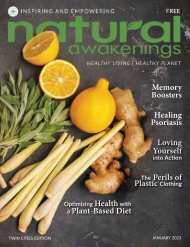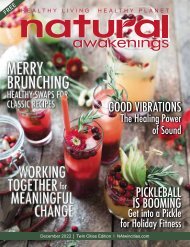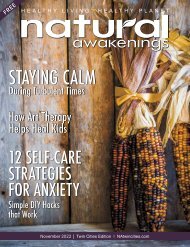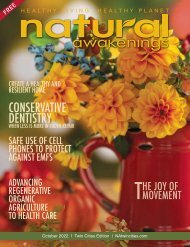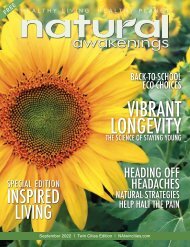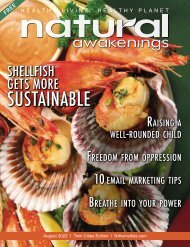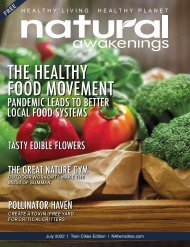Natural Awakenings Twin Cities January 2022
Read the January 2022 edition of Natural Awakenings Twin Cities magazine. This is our annual Directory Issue which is focused on Annual Health and Wellness Guide. This month we feature articles on breast cancer causes, the cannabis industry, healthy coffee alternatives, wellness trends for 2022 and so much more! Be sure to check out our local content including News Briefs announcements, Community Resource Guide with providers throughout the metro who can meet your individual wellness needs, and all the happenings in the Calendar of Events. There is additional online-only content that can be found at NATwinCities.com. While you are there, be sure to sign up for our Newsletter and Digital Magazine and continue your reading with our archived articles from local experts.
Read the January 2022 edition of Natural Awakenings Twin Cities magazine. This is our annual Directory Issue which is focused on Annual Health and Wellness Guide. This month we feature articles on breast cancer causes, the cannabis industry, healthy coffee alternatives, wellness trends for 2022 and so much more!
Be sure to check out our local content including News Briefs announcements, Community Resource Guide with providers throughout the metro who can meet your individual wellness needs, and all the happenings in the Calendar of Events. There is additional online-only content that can be found at NATwinCities.com.
While you are there, be sure to sign up for our Newsletter and Digital Magazine and continue your reading with our archived articles from local experts.
Create successful ePaper yourself
Turn your PDF publications into a flip-book with our unique Google optimized e-Paper software.
According to market<br />
analysis firm CB Insights,<br />
“As COVID-19 spread<br />
across the globe, shifting<br />
consumer behavior and<br />
virus outbreaks in factories<br />
has dealt major blows to the meat supply chain, with the beef<br />
industry alone facing an estimated $13.6 billion in losses.” Several<br />
U.S. meat processing plants were forced to close their doors.<br />
In response, a growing inventory of plant-based alternative<br />
proteins is emerging, offering new products that seek to mimic<br />
the experience of eating a juicy hamburger (Beyond Meat and<br />
Impossible Foods) or crispy chicken nugget (Simulate). Banza<br />
makes high-protein pasta from chickpeas. Retail sales of plantbased<br />
meals in the U.S. have grown by 25.5 percent over the<br />
past two years, and other manufacturers joining the field are<br />
Plantible Foods, Rebellyous Foods, Livekindly and InnovoPro.<br />
A recent survey found that 36 percent of consumers intend to<br />
increase their consumption of alternative protein sources in the<br />
near future.<br />
Perlmutter cautions, “Just because they’re plant-based doesn’t<br />
give them full sanction. They may contain unfermented soy,<br />
which may not be non-GMO or organic, and per an article in<br />
the New York Times, their carbon footprint may be a lot higher<br />
in production of these products than we have been led to believe.<br />
Do a little research on these manufactured foods and go<br />
for plant-based options that aren’t processed. Shop the periphery<br />
of the grocery store.”<br />
Telemedicine Will Continue<br />
After the Pandemic<br />
According to management consultants McKinsey and Company,<br />
when COVID-19 began, the level of telemedicine increased<br />
in America 78-fold, peaking in April 2020. Although it has been<br />
declining since then, the use of telemedicine is still at a 38-fold<br />
increase compared to pre-pandemic times. “While it has leveled<br />
off, we are going to see persisting use of telemedicine in situations<br />
that involve basic communication with a patient,” says<br />
Perlmutter, citing compelling attributes such as cost savings,<br />
convenience and a lower carbon footprint because people don’t<br />
have to commute to a doctor’s office.<br />
Wearable Devices and<br />
Home Testing Empower Patients<br />
Perlmutter also anticipates an amplification of the use of wearable<br />
devices and home testing to provide biometric data that informs<br />
people about their health status and inspires them to modify<br />
lifestyle choices. The Oura Ring records the time it takes to get to<br />
sleep, how many times the wearer awakens during the night and<br />
how much time they spend in REM and deep sleep. This information<br />
enables people to modify day-to-day activities to improve the<br />
quality and quantity of sleep.<br />
Apple Watch aficionados are increasingly relying on the<br />
device’s biofeedback features, including its newest metric, blood<br />
oxygenation, while diabetics<br />
and non-diabetics<br />
alike employ continuous<br />
glucose monitoring systems<br />
to pinpoint how lifestyle<br />
choices like food, exercise<br />
and sleep affect blood sugar levels. “That is not only trending<br />
now, but will increase quite dramatically as consumers push to<br />
learn more about themselves,” Perlmutter predicts. “No longer is<br />
this information going to be siloed in the doctor’s office. People<br />
are becoming more and more empowered to learn this data about<br />
themselves and act on it.”<br />
“Core concepts like being present in the moment or<br />
taking in the other person in an empathetic way are<br />
rippling out into so many aspects of life.”<br />
–Leslie Davenport<br />
Learning to Improve Genetic Expression<br />
“Our evolving understanding of epigenetics—how we can change<br />
our gene expression—is bringing more people on board to the<br />
idea that our lifestyle choices matter,” Perlmutter says. “When<br />
I went to medical school, we thought our DNA was locked in a<br />
glass case and that it would determine everything about us. Nowadays,<br />
we know that the expression of more than 70 percent of our<br />
DNA that codes for health and longevity is under our control and<br />
influenced by our lifestyle choices. The food we eat, whether or<br />
not we slept well last night, the stress in our lives, whether or not<br />
we spent time in nature—all of these things, moment-to-moment,<br />
change our gene expression. Holy Toledo! We now know that<br />
certain lifestyle choices are good for you because they favorably<br />
change gene expression. They teach it in med school now. It’s a<br />
breathtaking reality.”<br />
Harnessing the Power of Low-Level Stress<br />
Life hackers and high-performance junkies are looking to leverage<br />
something called hormesis, which involves introducing low-level<br />
stress to the body for a positive outcome, so that when the body<br />
repairs itself from that condition, it doesn’t just repair back to the<br />
previous level, but to a new one with an advantage. This includes<br />
exposing the body to a hot sauna or cold exposure through<br />
cryotherapy, as well as intermittent fasting or time-restricted eating.<br />
“People are starting to see how good things happen when we<br />
engage in things that push us in places that are perhaps a little bit<br />
uncomfortable, activating mechanisms that help with metabolic<br />
health, immunity, cognitive function and even the growth of new<br />
brain cells,” Perlmutter explains.<br />
Mental Health Destigmatized<br />
When U.S. gymnast Simone Biles dropped out of the 2021 Summer<br />
Olympic Games citing mental health challenges, she created<br />
an opening for other people to speak up. If a world champion<br />
could reveal her vulnerability on the global stage when the stakes<br />
were so high, certainly so could they. Her compelling story is<br />
emblematic of an emerging trend: Mental health is gradually<br />
becoming destigmatized.<br />
“It’s becoming acceptable to talk about our feelings and ask<br />
for help, and this trend is shattering unhealthy cultural myths,<br />
like the erroneous assumption that if we talk about our emotions<br />
<strong>January</strong> <strong>2022</strong><br />
13



